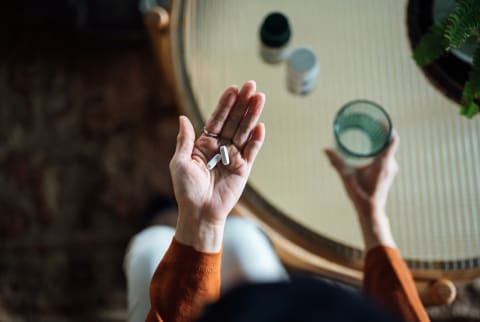Advertisement
The 4 Supplements This Nutrition Scientist Takes Daily For Stronger Muscles*


As a key member of mindbodygreen's scientific affairs team, Emma Engler, M.S., has her nose in PubMed (basically a researcher's version of Google) all day. She meticulously combs through heaps of peer-reviewed studies on each of the ingredients in mindbodygreen's supplements+ formulas. Needless to say, she knows a thing or two about which supplements—and in what amounts—have the science to back them up.
While Engler notes that her own supplement routine can be fluid (depending on her goals and needs at the time), here are the four supplements that she herself currently takes every day:
Whey protein
"In general I struggle to reach my daily protein needs," says Engler. "Adding in a high-quality whey supplement is an easy and effective way to up my protein intake."
Whey is one of two types of protein found in milk (the other being casein), and it's among the most well-researched dietary supplements1. "It not only helps address protein gaps in the diet as a high-quality source of protein but supports muscle protein synthesis, muscle strength and repair, and whole-body health."
What she looks for in a supplement: Engler prefers whey protein isolate supplements over concentrate. Because (contrary to the names), whey isolate is a more concentrated or filtered source of protein. It's made by removing fats, carbohydrates, and other nutrients, so the result is a product that's up to 95% protein and less than 1% lactose2. Engler also prefers grass-fed choices free of chemical flavoring (and other gross ingredients). She looks for options that provide 20 to 25 grams of protein per serving.
How she takes it: "Since I typically work out in the morning, I prefer to take it around the time of my breakfast," says Engler. "I love starting the day out with a high-protein breakfast as it's satiating and helps me more evenly distribute my protein intake throughout the day." Whey protein mixes well in smoothies, oatmeal, and yogurt.
Creatine
Creatine is the newest addition to Engler's regimen, and there's no shortage of research showcasing its safety and efficacy.
Creatine is a naturally occurring compound in the body from amino acids that plays a crucial role in energy production for muscle contractions. It's also available as a supplement and is a go-to choice for those looking to enhance their muscle mass, strength, and power. That's because it actually works: Studies show taking creatine supplements daily3 benefits everything from the muscles to brain health and bone health.
What she looks for in a supplement: Engler looks for supplements that offer pure creatine monohydrate—no excipients—because it's virtually tasteless on its own and disperses easily into liquids.
How she takes it: "I stick to 5 grams of creatine monohydrate daily," says Engler. While she takes it around the same time as her workouts, research shows you don't have to be too stringent on the timing of this supplement as long as you're consistent with it. (And yes, you can take creatine and whey at the same time.)
ultimate multivitamin+
Biases aside, Engler truly loves mindbodygreen's ultimate multivitamin+, noting that it's the most comprehensive daily multivitamin on the market in just two capsules—providing 14 vitamins, 13 minerals, and six longevity antioxidants.*†
And each of these 33 ingredients comes in a premium form, designed to be bioavailable and gentle.*
"This is the first multivitamin that doesn't upset my stomach," says Engler. "Minerals like iron are known for being harsh on the stomach, but the chelated forms used in ultimate multivitamin+ make all the difference."
What she looks for in a supplement: Clearly, ultimate multivitamin+ takes the cake here. But no matter which multi you choose, just be wary of ones that aren't complete (they're lacking key vitamins and minerals in efficacious amounts). That can include gummy multis.
How she takes it: ultimate multivitamin+ is best taken with a meal, so Engler pairs her two daily capsules with her morning nosh after a workout.
Fish oil
Fish oil is rich in healthy omega-3 fatty acids—namely EPA and DHA. While eating fish is a great (and tasty) way to load up on these nutrients, many fall short of reaching the recommended amounts of EPA and DHA. And even if you do eat fish, it's likely not enough to get you a therapeutic amount of these nutrients to make a difference in your heart4, brain5, or immune6 health.*
"I'm thoughtful about the amount of omega-3s I consume in my diet. But earlier this year I decided to get my Omega-3 Index tested." This is a blood biomarker test that measures the quantity of EPA and DHA in the blood.
"My score ended up coming in a bit under the 7% mark. Which is pretty good, but it's not optimal," says Engler. "An Omega-3 Index in the 8-12% range7 is shown to best support heart, brain, eye, and joint health. And of course, I would rather be reaching optimal omega-3 intake."*
So Engler decided to add in a high-quality omega-3 supplement to bump up her Omega-3 Index even more.
What she looks for in a supplement: Engler looks for a supplement with the triglyceride form of omega-3s (since it has better bioavailability) and ones that only use sustainably sourced, wild-caught fish. Also, you want to aim for a dose of 1,000 milligrams or greater. mindbodygreen's omega-3 potency+ fits the bill (and is the one Emma reaches for), but here are a few of our other favorites.
How she takes it: Engler is a bit more flexible on the time of day she takes her fish oil supplements but will always take them around the time of a meal to support optimal absorption of the fats.
The takeaway
Engler's supplement routine prioritizes the foundations and amino acids that support muscle health (although she still loves this supplement for a productivity boost now and then). While everyone's ideal supplement routine will look a little different based on their goals and nutritional needs, hers is a solid jumping-off point when curating your own routine.
If you're still not sure where to start, take our dietitian-formulated quiz to narrow the search and pinpoint the best choices for you.
7 Sources
- https://pubmed.ncbi.nlm.nih.gov/29087242/
- https://www.ncbi.nlm.nih.gov/books/NBK44624/#ch3.s20
- https://www.ncbi.nlm.nih.gov/pmc/articles/PMC5469049/
- https://www.ncbi.nlm.nih.gov/pmc/articles/PMC7072971/
- https://www.ncbi.nlm.nih.gov/pmc/articles/PMC4537710/
- https://www.ncbi.nlm.nih.gov/pmc/articles/PMC3257651/
- https://pubmed.ncbi.nlm.nih.gov/28511049/
Watch Next
Enjoy some of our favorite clips from classes
Enjoy some of our favorite clips from classes
What Is Meditation?
Mindfulness/Spirituality | Light Watkins
Box Breathing
Mindfulness/Spirituality | Gwen Dittmar
What Breathwork Can Address
Mindfulness/Spirituality | Gwen Dittmar
The 8 Limbs of Yoga - What is Asana?
Yoga | Caley Alyssa
Two Standing Postures to Open Up Tight Hips
Yoga | Caley Alyssa
How Plants Can Optimize Athletic Performance
Nutrition | Rich Roll
What to Eat Before a Workout
Nutrition | Rich Roll
How Ayurveda Helps Us Navigate Modern Life
Nutrition | Sahara Rose
Messages About Love & Relationships
Love & Relationships | Esther Perel
Love Languages
Love & Relationships | Esther Perel
What Is Meditation?
Box Breathing
What Breathwork Can Address
The 8 Limbs of Yoga - What is Asana?
Two Standing Postures to Open Up Tight Hips
How Plants Can Optimize Athletic Performance
What to Eat Before a Workout
How Ayurveda Helps Us Navigate Modern Life
Messages About Love & Relationships
Love Languages
Advertisement

Yes, There's A Longevity Vitamin (& People Over 40 Need To Prioritize It)
Molly Knudsen, M.S., RDN

Study Investigates How Fasting Impacts Sleep, Hormone Health & More
Gretchen Lidicker, M.S.

Yes, There's A Longevity Vitamin (& People Over 40 Need To Prioritize It)
Molly Knudsen, M.S., RDN

Study Investigates How Fasting Impacts Sleep, Hormone Health & More
Gretchen Lidicker, M.S.

Yes, There's A Longevity Vitamin (& People Over 40 Need To Prioritize It)
Molly Knudsen, M.S., RDN

Study Investigates How Fasting Impacts Sleep, Hormone Health & More
Gretchen Lidicker, M.S.

Yes, There's A Longevity Vitamin (& People Over 40 Need To Prioritize It)
Molly Knudsen, M.S., RDN

Study Investigates How Fasting Impacts Sleep, Hormone Health & More
Gretchen Lidicker, M.S.















